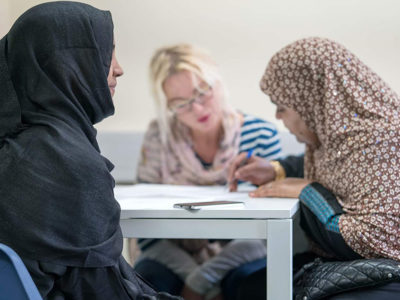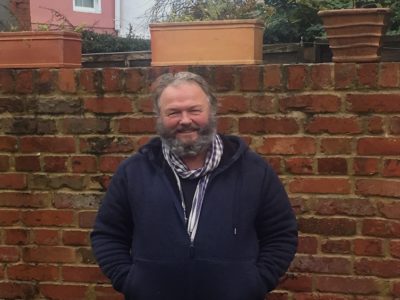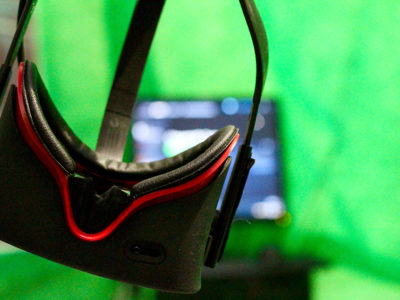Other uses of VR in Cardiff
FOR Cardiff and Orchard 360 have created VR and augmented reality Christmas experiences for all ages, which will be ready for visitors to try in St David’s shopping centre until the end of December.
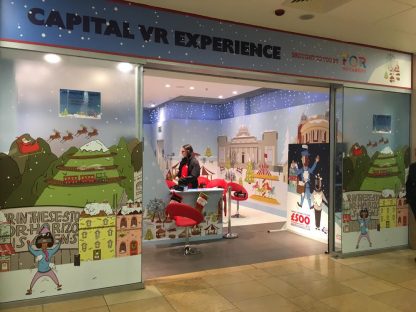
The three VR experiences include:
- A playful snowball fight
- Santa’s reindeer sleigh training experience where you ride on Santa’s sleigh through a starry sky
- And a view from the top of Mount Snowdon
The augmented reality project involves hidden presents in the form of QR codes which will be dotted around the shopping centre for visitors to find. Using a smartphone, you scan the QR code and a virtual 3D present will pop up above the code. Once someone has discovered all 12 presents, they’ll automatically be entered into a prize draw.
Orchard 360 is also involved in trialing the use of VR as a form of distraction therapy at Llandough hospital. The immersive aspect of the technology allows patients suffering from pain, anxiety or stress to distract themselves away from their real-life ailments.
Atticus Digital condensed down a five-hour lecture into an immersive ten-minute learning experience in VR on the Oculus Rift for EDF Energy. The sustainability project was designed for employees to “learn by doing”. The agency found that the knowledge retention of the participants was significantly high because of how engaging they found the experience.
Welsh National Opera (WNO) collaborated with London based VR company REWIND to create the Magic Butterfly VR opera experience this year, which took place inside a shipping container.
Martin Shervington and Elise Evans had the first VR wedding. The couple got married back in May in Wales this year using AltspaceVR, which is a VR social media platform.
Estate agents in Cardiff such as Jeffrey Ross are using VR viewings to let people look around properties from their desktop, iphone or ipad.
A study conducted by the school of psychology at the University of Cardiff is looking at the use of VR to gain a better understanding of vertigo.
Independent game developer Filthy Fresh Studios have created a VR game called Jeff’s Tower.
Can virtual reality headsets be used as ’empathy machines’? Cardiff’s creative agencies are raising awareness using VR
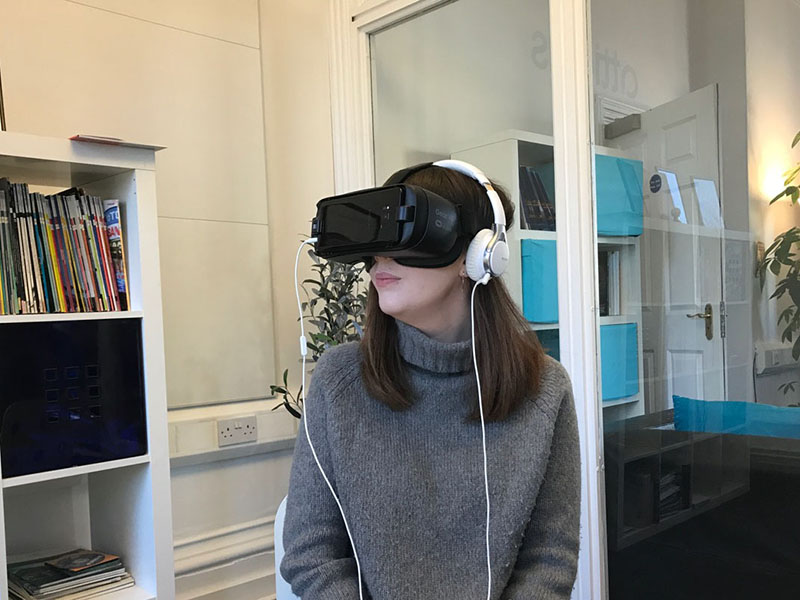
Trying out the SSAFA experience in Atticus Digital’s office in Cardiff (Photo: Martin McCabe)
You put on a virtual reality headset. You’re now a soldier. In the heat of battle with your fellow fighters, your heart pounds and adrenaline pumps through your veins.
Then you find yourself off the battlefield and back home, but home doesn’t feel like home anymore and the battle of returning to everyday civilian life becomes your new fight.
Cardiff-based agency Atticus Digital worked with the Armed Forces charity the SSAFA to create this virtual reality experience in aide of the Invisible Enemy campaign, which seeks to raise awareness about the loneliness and isolation many veterans face when they return home from the battlefield.
This is just one example of an emotionally driven experience created by a local creative agency who have been raising awareness for charitable causes using virtual reality technology.
Virtual reality (VR) is an innovative, exciting technology that integrates imagery and sound to create immersive, 3D worlds anyone can experience through a headset.
Martin McCabe, managing director at Atticus Digital, welcomed the challenge of creating the SSAFA experience but quickly felt the weight of what they were making when one of the extras in the project spoke of his real experiences leaving the army.
“The intention was to provoke a conversation,” Martin says, before heartfeltly adding, “it’s a real issue and a difficult one to deal with as well.”
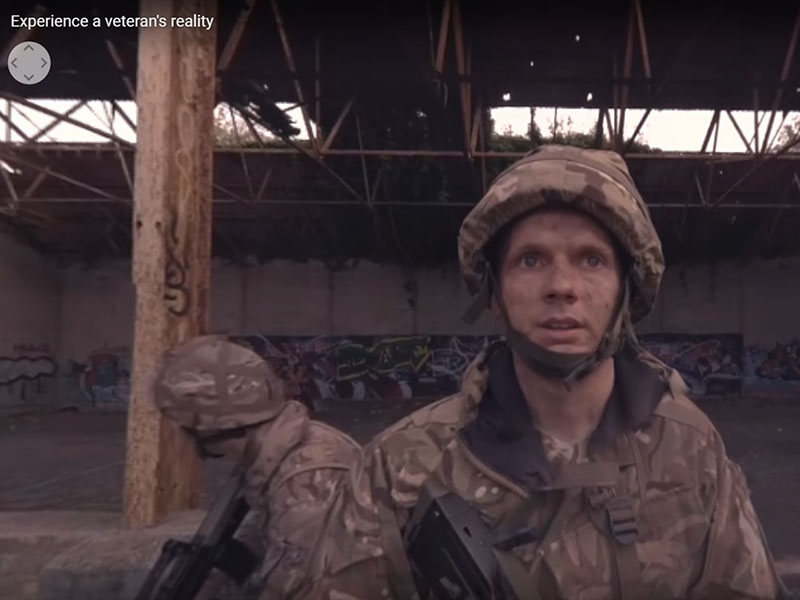
The SSAFA’s VR project lets you experience a veteran’s reality
Tackling real issues with VR is no easy task, but the engaging nature of the tech has the power to give real weight to a cause.
With VR’s ever-increasing presence in Wales in recent years, the Visioning New Realities event held by Creative Cardiff and BAFTA Cymru in November, demonstrated the broad range of ways VR is being used at a local level.
But what came through the most from the event was VR’s power to create experiences that have a lasting effect on its user by opening our minds to unseen worlds and issues within our society, just like the SSAFA project.
The ‘empathy machine’
The immersive and interactive nature of VR enables its users to connect with what they’re seeing on a deeper, more emotional level, which has earnt the VR headsets in all their forms the moniker of the ‘empathy machine’.
Orchard 360 is another example of a local creative agency who have been working on a diverse range of VR experiences that draws on the idea of using empathy to evoke an emotional response in the name of charitable causes.
Head of VR, Glenn Hapgood, is all too aware of the powerful impact VR can have.
“VR is probably one of the best ways to drive empathy,” Glenn says.
Glenn revealed the company is working with The Wallich (a local homeless charity), to create a VR experience that will give its audience a real sense of what it’s like to be a person living on the streets.
Glenn explained the experience will include scenes where people are ignoring you, to more upsetting aspects like enduring intimidation and even assault through the video itself.
“It’s quite hard-hitting,” Glenn says, before continuing, “it’s meant to be. But hopefully, it will allow people to truly feel what it’s like to be a homeless person in Cardiff these days.”
Glenn hopes the project will drive public opinion, increase empathy towards the homeless people themselves, and ultimately encourage more donations to the Wallich.
Virtual reality sickness
Since important causes are using VR to raise awareness in the city, the issue surrounding motion sickness some people suffer from when using the technology is still very much a concern
A recent study conducted by scientists (via sciencenews) estimates around 25 to 40 percent of people experience motion sickness depending on what mode of transport they use, which can deter many from even wanting to try out the headsets.
Cardiff University senior lecturer Glyn Mottershead is one such individual who has felt sick after trying a VR headset. Glyn said he would feel reluctant to try another VR experience, and the thought of potentially feeling sick again certainly wouldn’t make him reach into his pocket to donate to anyone who uses VR to promote their cause.
It’s a constant hurdle creators using VR technology have to overcome. Martin from Atticus Digital says poorly made VR experiences damage the reputation of the tech.
“They can put people off VR for life. If you have a bad experience and you don’t like it, you’re not going to want to try it again,” Martin explains.
Of course, it’s important to remember VR is a relatively new piece of tech that’s continually advancing. With every improvement, VR creators are optimistic that more people will be able to tolerate the virtual worlds in future.
Back to the real world
By creating VR experiences, Cardiff’s creative sectors can broaden our horizons and draw our attention to causes we should be looking at in a unique and effective way.
Once you remove the headset, you’re not a soldier anymore. But for a short period of time, you were able to gain a perspective on a real-world struggle someone faces.
Whether it’s on the battlefield or on the streets of Cardiff, VR has the power to take us to many places. And, as Cardiff’s creative agencies have demonstrated, it also might have the power to help make a difference.
Other uses of VR in Cardiff
FOR Cardiff and Orchard 360 have created VR and augmented reality Christmas experiences for all ages, which will be ready for visitors to try in St David’s shopping centre until the end of December.

The three VR experiences include:
- A playful snowball fight
- Santa’s reindeer sleigh training experience where you ride on Santa’s sleigh through a starry sky
- And a view from the top of Mount Snowdon
The augmented reality project involves hidden presents in the form of QR codes which will be dotted around the shopping centre for visitors to find. Using a smartphone, you scan the QR code and a virtual 3D present will pop up above the code. Once someone has discovered all 12 presents, they’ll automatically be entered into a prize draw.
Orchard 360 is also involved in trialing the use of VR as a form of distraction therapy at Llandough hospital. The immersive aspect of the technology allows patients suffering from pain, anxiety or stress to distract themselves away from their real-life ailments.
Atticus Digital condensed down a five-hour lecture into an immersive ten-minute learning experience in VR on the Oculus Rift for EDF Energy. The sustainability project was designed for employees to “learn by doing”. The agency found that the knowledge retention of the participants was significantly high because of how engaging they found the experience.
Welsh National Opera (WNO) collaborated with London based VR company REWIND to create the Magic Butterfly VR opera experience this year, which took place inside a shipping container.
Martin Shervington and Elise Evans had the first VR wedding. The couple got married back in May in Wales this year using AltspaceVR, which is a VR social media platform.
Estate agents in Cardiff such as Jeffrey Ross are using VR viewings to let people look around properties from their desktop, iphone or ipad.
A study conducted by the school of psychology at the University of Cardiff is looking at the use of VR to gain a better understanding of vertigo.
Independent game developer Filthy Fresh Studios have created a VR game called Jeff’s Tower.


